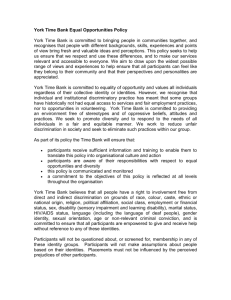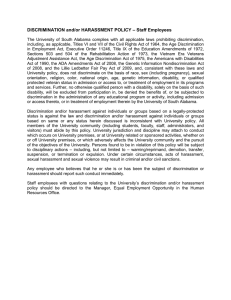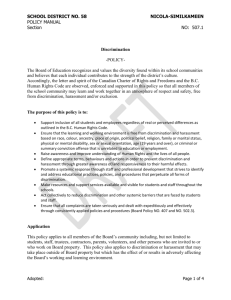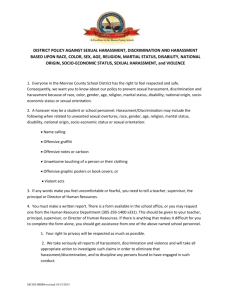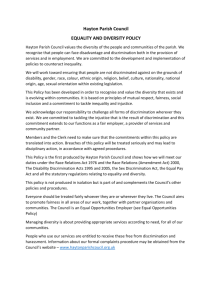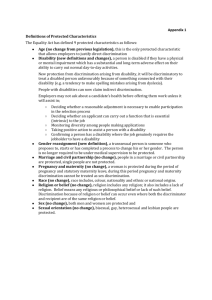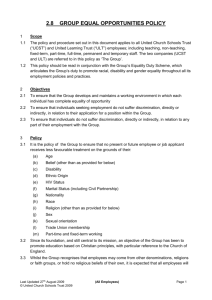Discrimination Terms and Definitions
advertisement
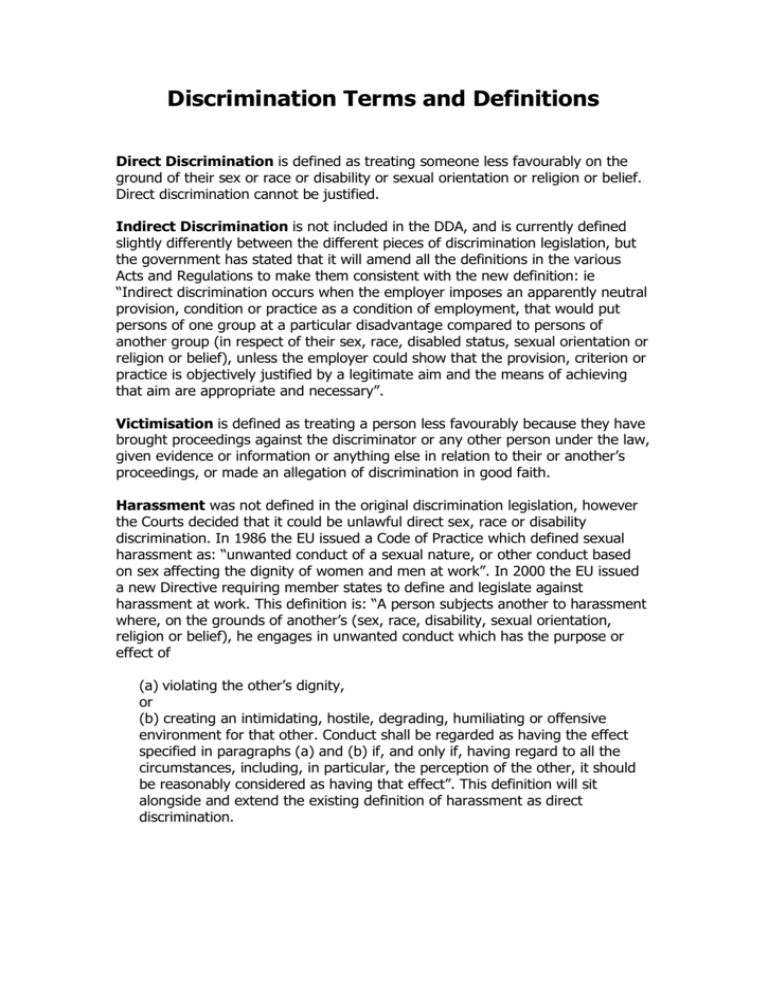
Discrimination Terms and Definitions Direct Discrimination is defined as treating someone less favourably on the ground of their sex or race or disability or sexual orientation or religion or belief. Direct discrimination cannot be justified. Indirect Discrimination is not included in the DDA, and is currently defined slightly differently between the different pieces of discrimination legislation, but the government has stated that it will amend all the definitions in the various Acts and Regulations to make them consistent with the new definition: ie “Indirect discrimination occurs when the employer imposes an apparently neutral provision, condition or practice as a condition of employment, that would put persons of one group at a particular disadvantage compared to persons of another group (in respect of their sex, race, disabled status, sexual orientation or religion or belief), unless the employer could show that the provision, criterion or practice is objectively justified by a legitimate aim and the means of achieving that aim are appropriate and necessary”. Victimisation is defined as treating a person less favourably because they have brought proceedings against the discriminator or any other person under the law, given evidence or information or anything else in relation to their or another’s proceedings, or made an allegation of discrimination in good faith. Harassment was not defined in the original discrimination legislation, however the Courts decided that it could be unlawful direct sex, race or disability discrimination. In 1986 the EU issued a Code of Practice which defined sexual harassment as: “unwanted conduct of a sexual nature, or other conduct based on sex affecting the dignity of women and men at work”. In 2000 the EU issued a new Directive requiring member states to define and legislate against harassment at work. This definition is: “A person subjects another to harassment where, on the grounds of another’s (sex, race, disability, sexual orientation, religion or belief), he engages in unwanted conduct which has the purpose or effect of (a) violating the other’s dignity, or (b) creating an intimidating, hostile, degrading, humiliating or offensive environment for that other. Conduct shall be regarded as having the effect specified in paragraphs (a) and (b) if, and only if, having regard to all the circumstances, including, in particular, the perception of the other, it should be reasonably considered as having that effect”. This definition will sit alongside and extend the existing definition of harassment as direct discrimination. Bullying is harassment and would constitute unlawful discrimination if the person suffered the less favourable treatment on the grounds of sex, race, disability, sexual orientation, religion or belief. If the treatment constitutes harassment on any other grounds then claims cannot be pursued within discrimination law at an Employment Tribunal. Consideration could be given to dealing with the treatment within Health & Safety legislation. Chartered Institute Of Managers rely on the below definition of bullying. Offensive, intimidating, malicious or insulting behaviour, or abuse or misuse of power, which violates the dignity of, or creates a hostile environment which undermines, humiliates, denigrates or injures, the recipient. Equal Pay is the concept of paying men and women the same money for • work that is the same or broadly similar (“like work”) • work rated as equivalent under a job evaluation scheme • work which is different but which is of equal value in terms of the demands of the job. Where there is disproportionate pay between a woman and a man, or groups of men and women, the Chief Officer must show that the difference is genuinely due to a material factor unconnected with sex. He or she would need to demonstrate that the practice represents a real need on the part of the Force and is appropriate and necessary for achieving that need. Disability is defined by the DDA as: “any child or adult with a physical or mental impairment that affects their ability to carry out normal day to day activities which are substantial, adverse and long term”. The DDA requires employers to make reasonable adjustments where working arrangements or physical features place a disabled employee or job applicant at a substantial disadvantage to persons who are not disabled. The Chief Officer must show that any failure to make reasonable adjustments is justifiable.

